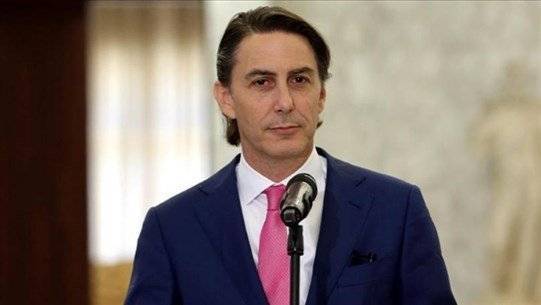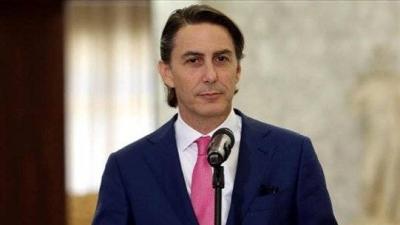After Israel expressed optimism about reaching an agreement with Lebanon regarding maritime border demarcation, Lebanon reciprocated with optimism yesterday following the visit of U.S. mediator Amos Hochstein, choosing not to announce all details of his negotiations in order to support the endeavors. However, this optimism is mixed with anxiety since the formulas being discussed remain unclear. What can be confirmed is the U.S. insistence on reaching an agreement that ensures the security of the Karish gas extraction and the urgency of obtaining a Lebanese position that does not endorse the threats of "Hezbollah" against Israel. Hochstein, like the Israeli side, recognizes that the drones and the following video from the day before yesterday bolstered the Lebanese position and gave momentum to the negotiations. Following these developments, Hochstein returned with doses of optimism, even though what he brought did not contain anything new. The Lebanese position remained the same, especially since any retreat on their part would jeopardize their internal position given that there is a ceiling Lebanon cannot exceed in the negotiations.
This is the first time that he has expressed satisfaction with the atmosphere of his meeting with the three presidents at Baabda Palace. Since the beginning of his mediation, he had privately mentioned that there was no unified position among Lebanese officials, and each had a different approach to the demarcation issue. Hochstein sensed, according to attendees at the Baabda meeting, a consensus among Lebanon that differed from the earlier stages of negotiations. Conversely, he felt from everyone he met a serious American effort to engage and a desire to expedite steps to complete the agreement and return to the negotiation table in Naqoura.
What Hochstein heard from Lebanese officials was a firm commitment to assert Lebanon's full rights without conceding an inch, insisting on Line 23 with all the gas in the Qana field, completely rejecting discussions about the proposal suggesting all of Qana in exchange for part of Block 8, as well as rejecting the offer for joint exploration. Hochstein, who previously carried a Lebanese proposal to the Israeli side, demands Line 23 with an additional area beyond it, known as 23+. The Israelis sent back Line 23- which means they proposed a line against a line. They also raised a financial compensation for the part of Qana facing the Israelis. Sources at the meeting confirmed that Lebanon has determined its right to Line 23 with the entirety of Qana, and based on the agreement signed with Total, no lesser formula is acceptable.
The American mediator promised to work on points of convergence between Lebanon and Israel and to return with a proposal prepared by him and his team for presentation to both the Israeli and Lebanese sides. If both parties agree to the proposals, a swift return to negotiations in Naqoura and the crystallization of the agreement in a later stage are expected, likely after the formation of the new Israeli government. He candidly told the officials: "Lebanon cannot get everything it wants and must adhere to its officially recorded borders at the United Nations, which are the basis for negotiations," warning that any new proposals could jeopardize the negotiations. Hochstein, who repeated his promise to expedite steps towards an imminent agreement, committed to returning to Lebanon again to pave the way for a return to Naqoura, stating: "We are moving in a positive direction which will accelerate if diplomatic issues do not occur."
During the discussions, it was clear from what Hochstein said that the primary Israeli demand was to secure the safety of Karish, where significant financial amounts have been allocated for exploration up to this point. Both Israel and Lebanon are in urgent need of achieving practical results before next September. Informed sources reveal that Greece has also entered the fray to ensure the safety of the Greek ship in Karish, and after having denied ownership of the vessel, the American mediator confirmed that the ship is Greek. Sources reported that there were communications last week led by a Greek official in the Prime Minister's Office warning against any escalating steps by Lebanon towards the ship. The assistant to the Greek Prime Minister sent inquiries to the Lebanese chargé d'affaires in Greece regarding the threats issued by "Hezbollah" towards the Greek ship, a situation that displeased the Greek ambassador in Lebanon, who had denied her country's ownership of the ship. The ambassador urged Lebanon, through a diplomat, not to take seriously the events surrounding the summons of the Lebanese chargé d'affaires.
On the Lebanese side, optimism was raised, speaking about the agreement being at a point very close to completion, and that next September would bring breakthroughs for Lebanon in this file. If an agreement were reached, the matter would be presented through an extraordinary government meeting coordinated between the President and the Prime Minister, which would then be forwarded to the Parliament for approval. However, the reality can be summed up by stating that there has been tangible progress with "give and take" between the two concerned parties, and this time the American mediator has taken it upon himself to prepare a formula for a solution that would receive the approval of both relevant parties, preferring not to delve into details to ensure the success of the mediation.




